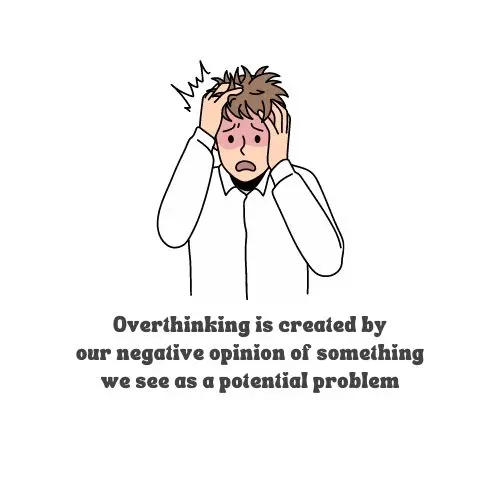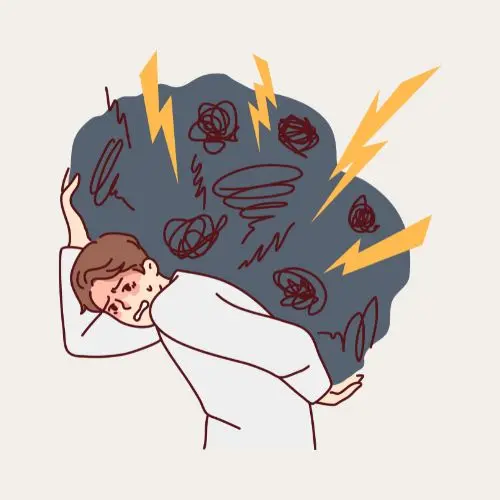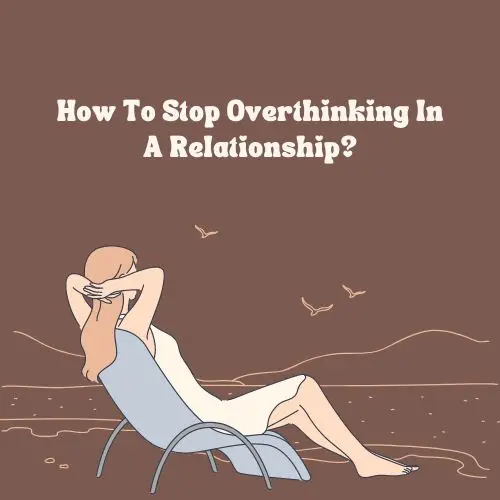Breaking the Overthinking Cycle: A Path to Relationship Peace
Has your mind ever spiraled into endless circles of doubt, suspicion, and negative assumptions about your partner or relationship? The frantic thoughts race as you analyze every interaction, conversation, and situation from every possible angle, torturing yourself with worst-case scenarios and hunting for hidden meanings.
Welcome to the maddening world of overthinking – that destructive habit of fixating irrationally on your thoughts rather than facts. In the context of romantic relationships, this toxic pattern clouds your judgment, sabotages your trust, and needlessly seeds conflict and emotional turmoil into an otherwise healthy partnership.
Overthinking in Relationships: Costs & Solutions

| Issue | Impact | Solution |
|---|---|---|
| Rumination | Anxiety, Insecurity | Mindfulness, Self-Awareness |
| Projecting | Mistrust, Defensiveness | Communication, Understanding |
| Catastrophizing | Fear, Conflict Escalation | Realistic Thinking, Problem-Solving |
| Mind Reading | Assumptions, Emotional Distance | Openness, Empathy |
| Negative Filtering | Resentment, Disconnection | Gratitude, Focusing on Positives |
If you’re an overthinker, you know this cycle all too well – the relentless worrying, ruminating on past disappointments, seeing situations through a negative filter, and imagining your partner’s motivations through inaccurate mind-reading. It’s an exhausting and anxiety-fueling experience that gradually poisons the well of intimacy, vulnerability, and genuine connection you crave.
The good news is, you have the power to break free from the shackles of overthinking once and for all. By exploring the root causes and costs of this destructive mental habit while adopting proactive strategies for more mindful thinking, you can save your relationship from the damage of irrational rumination cycles.
Imagine a relationship where tranquil confidence replaces chronic insecurity, where open communication flows unobstructed by baseless assumptions and worst-case projections. A partnership where you can be fully present to cherish each passing moment rather than trapped in your anxious inner narratives about the future or past.
With awareness, discipline, and guidance, you can escape the mental prison of overthinking and reclaim a sense of peace and stability in your romantic life. You’ll rediscover the joy of simply being with your partner without the endless static of worry and suspicion. Most importantly, you can strengthen the foundation of trust, intimacy, and teamwork, allowing your relationship to thrive.
The Harmful Effects of Overthinking

While everyone ruminates occasionally, once overthinking becomes a chronic habit, it yields devastating costs to your relationship’s well-being. Exploring the common flavors of overthinking illuminates why controlling these toxic mental patterns is critical.
Rumination and Recycled Insecurity
One of the core drivers of overthinking is an inability to let go of past disappointments, arguments, or mistakes. Your mind becomes preoccupied with reliving those events, self-criticizing, and worrying about reoccurrences. This mental habit breeds crippling insecurity and anxiety that you project onto your partner and undermine trust.
Projecting and Unfounded Suspicion
Every minor situation or ambiguous incident is scrutinized when you’re in an overthinking loop. You blow things out of proportion, search for hidden meanings, and assume the worst about your partner’s intentions, words, or behaviors. Completely unfounded suspicions erode the foundation of implicit trust in your relationship.
Catastrophizing and Emotional Reasoning
Overthinkers also tend to jump to bleak conclusions, ruminate on worst-case scenarios, and let their thoughts spiral into disastrous emotional reasoning. For example, if your partner states a need for more personal time, your catastrophic thinking may spiral to “they want to leave me” or “I’m not enough,” based purely on your anxious emotions rather than facts.
Mind Reading and Unrealistic Expectations
Similarly, overthinkers commonly layer negative assumptions onto their partner’s actions or words through the lens of their insecurities. “They said this innocuous statement, which indicates [catastrophic assumption].” In essence, you believe you can read your partner’s mind, intent, and motivations, which leads to unrealistic expectations that inevitably disappoint.
Negative Filtering and Reality Gaps
Finally, overthinkers filter out positives, success experiences, and factors that contradict worries, ruminating solely on perceived negative signals. This selective processing disconnects you from the grounded reality of your relationship. Over time, this pessimistic filtering erodes gratitude and appreciation for your partner.
As you can see, the different flavors of overthinking share a common theme – they hijack your mind with inaccurate, negatively skewed perspectives that contaminate your judgment and emotional experience. Left unresolved, overthinking destroys the very foundations of romantic partnership – trust, empathy, mutual understanding, and intimate vulnerability.
Breaking the Spiral of Overthinking

While overthinking often stems from deep-rooted psychological drivers like attachment insecurity, you’re not powerless against this destructive pattern. With conscious effort, you can adopt specific mindset shifts and lifestyle changes to reprogram your habitual thinking for more peace.
Practice Mindfulness and Self-Awareness
Overthinkers get hopelessly tangled in their thoughts, unaware they’ve drifted into unreality until it’s too late. Cultivating a non-judgmental practice of present-moment mindfulness interrupts the overthinking cycle before it spirals out of control. Try meditation, yoga or simply pausing to take deep breaths when anxious thoughts arise.
Tune into your mental and emotional state throughout the day. Notice when your thoughts veer into overthinking spirals so you can consciously re-center yourself. The more awareness you build, the easier it becomes to short-circuit overthinking loops before they consume you.
Focus on the Concrete Facts
At its core, overthinking often results from emotionally charged assumptions and worst-case projections that contradict reality. When you catch yourself following these distorted thoughts, it’s critical to pause and rationally evaluate the concrete facts of the situation without your filter of fear.
Facts don’t have an emotional spin – they are impartial, objective observations about an incident or conversation, devoid of catastrophic interpretations of intent or motive. Write down the bare facts and compare them to your earlier emotional reasoning. You’ll likely realize your overthinking was wildly unrealistic compared to the actual circumstances.
Talk It Out and Seek Understanding
Open, blame-free dialogue with your partner is a key antidote to destructive overthinking. Rather than bottling up your anxious thoughts until they explode, express them calmly and seek mutual understanding. Be vulnerable and share your insecure thought processes with wisdom so your partner can address them.
At the same time, be an engaged listener who empathizes with your partner’s experiences, perspectives, and intentions. So much damaging overthinking stems from a lack of understanding of our partners’ origins. Make the brave choice to have uncomfortable conversations that short-circuit overthinking.
Practice Realistic Thinking and Problem-Solving
Overthinkers tend to live in the extremes, viewing challenges through all-or-nothing lenses that obscure objective truth. Counter this thinking distortion through cognitive reframing that encourages realistic thinking. Is this issue as cataclysmic as your anxious mind assumes, or is there a pragmatic middle ground where your partner can meet you?
If your relationship has legitimate problems, overthinking solves nothing – active problem-solving provides relief. Get aligned on the true issue, then brainstorm practical solutions you’re willing to commit to without judgment or catastrophizing. Working as a united team grounds you in positive action rather than fruitless rumination.
Express Appreciation and Count Your Blessings

Overthinkers get preoccupied with perceived negatives, but there’s transformative power in consciously refocusing your gratitude on the positives in your partner and relationship. Make a daily habit of appreciating the bright spots, no matter how minor – the affection, loyalties, compromises, laughs and couple wins.
Reflecting on the reasons you cherish your partner and relationship overrides the negative filter and crowns out catastrophizing. You’ll begin noticing all the evidence that directly challenges the inaccurate narratives of your overthinking mind. With intentional appreciation, the relationship renews itself in a cycle of goodness.
Seek Support and Outside Perspective
Finally, overthinkers often get stuck in self-reinforcing thought loops without exit ramps. Seeking outside support from counselors, coaches, or trusted confidantes provides a healthy, detached perspective to interrupt overthinking cycles and shine a light on blind spots.
Be courageous about sharing your struggles with overthinking in a blame-free manner. Trusted friends or professionals can offer clarifying viewpoints to reframe anxious thoughts more accurately. There is tremendous freedom in realizing that your subjective reality likely distorts the true situation that others can see clearly.
Overcome Destructive Overthinking
Ultimately, overcoming destructive overthinking in your relationship requires making a wholehearted choice. By intentionally implementing mindfulness habits, rational reframing, open dialogue, problem-solving, and appreciation into your relationship, you cultivate the awareness and skills to retrain your mind’s knee-jerk overthinking tendencies.
It won’t be effortless—like any destructive habit, overthinking takes conscious and ongoing effort to overcome. But the rewards of freeing yourself from the prison of overthinking make the work worthwhile. Stop torturing yourself and rediscover the true joys of a partnership built on unwavering trust, acceptance, intimacy, and teamwork.
Life unavoidably grants us enough stress and anxiety. Why create more through distorted lenses of irrational overthinking? When you catch yourself spiraling into familiar thought traps, resolve to pause, reframe, and invite your partner into a space of mutual understanding and realistic solutions. In doing so, you liberate yourself into a relationship of clarity, appreciation, and ever-deepening partnership.

